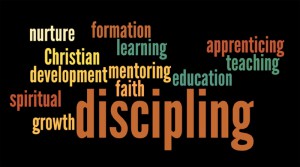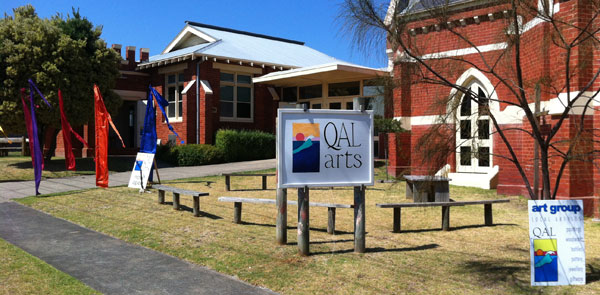“The hallmark of a ‘congregation of learners’ is a culture of learning in which learning permeates every aspect of the congregation.” John Roberto, Faith Formation 2020
From Bunbury to Nightcliff, Maroubra to Queenscliff, Wayville to North Ringwood, Uniting Church communities are being creative and intentional about forming lifelong disciples. Their stories are wonderful, energising and challenging.
 A couple of years ago I visited 21 communities across Australia and interviewed the leaders about being lifelong faith communities of disciples. They were ranged right across Australia – from Bunbury to Maroubra, from North Hobart to Nightcliff in Darwin. Urban and rural, young and old, diverse in culture and character. We had rich, varied, inspiring conversations.
A couple of years ago I visited 21 communities across Australia and interviewed the leaders about being lifelong faith communities of disciples. They were ranged right across Australia – from Bunbury to Maroubra, from North Hobart to Nightcliff in Darwin. Urban and rural, young and old, diverse in culture and character. We had rich, varied, inspiring conversations.
In particular, I wanted to discover what it means to be
– a learning community who learn intentionally about forming lifelong disciples
– ministry leader who provides effective educational leadership to a learning community
– a community of disciples who learn intentionally from and for their mission
In a Report to the Assembly Standing Committee in March 2013, these were promoted as key issues for congregational life and leadership. The new Assembly Formation, Education & Discipleship Unit and Working Group seek to partner with synods and presbyteries in fostering a focus on intentional discipleship in congregations and faith communities.
Parts of the interviews are gradually being put online on the FED Stories Video page. So far you’ll find stories from Queenscliff in Victoria, Parkes in NSW, Bunbury in WA, North Ringwood in VIC and The Gap in QLD.
The following key learnings emerged from the research:
The nature of Christian Education
- While Christian education is broad and multi-faceted, it is centred on lifelong growth in faith and Christian living for the sake of the coming reign of God: Christian education fosters discipleship for the sake of God’s mission.
- There is a lack of clarity within the Uniting Church about the nature and relationship of terms such as Christian education, formation, faith development, spiritual growth and discipling/discipleship. Leaders are more likely to speak of formation, discipleship or spiritual growth in congregational life.
- Effective Christian education needs particular kinds of learning to be present in the life of a congregation – developmental (age and stage-related), practice (being habit-formed) and discovery (open-ended, transformative)
- Christian education can take place in a variety of settings with people whose interest in church and spirituality differs; a broader range of approaches, strategies and settings is needed, particularly for those with no church background and those from other faiths.
- Effective Christian education is not only formal; it thrives where people are encouraged to hear God’s call, discover and develop their gifts, and actively discern their vocation in Christ.
- Christian education is both a distinctive area of ministry, yet also embedded in the formal and informal learning that takes places in worship, community life and mission service.
Congregations as Lifelong Learning Communities
- Effective Christian education requires an intentional culture that values, promotes and resources lifelong growth in faith, and acts adaptively to achieve this.
- Effective Christian education involves appropriate opportunities for formal and informal learning both within and across generations.
- Effective Christian education draws regularly on resources beyond the congregation, both receiving wisdom from others and sending its members to learn and serve.
- Christian education should take place in ways that reflect our theology and ethos as a church – our commitments to our first peoples; to being a multicultural church, a priesthood of all believers, a multigenerational community of faith, and a community of women and men.
- Lifelong learning communities pay particular attention to passing on the faith to the next generations, and order their lives accordingly.
Christian Education in Context
- Christian education attends to the formation of Christian identity, both belief and living, within the context of our globally connected, multicultural, multi-faith, pluralistic world.
- Christian education attends to learning within culture, learning from culture and learning across cultures.
- Christian education both shapes and is shaped by mission, an ongoing cycle of learning for and from active participation in one’s local context and beyond.
- Christian education needs greater attention to the ways that people explore and express meaning and spirituality in everyday life – in language, relationships, culture and patterns of living.
Leadership in Christian Education
- Effective Christian education involves intentional educational leadership that builds a culture of lifelong learning, seeks appropriate learning resources, attends to formation in Christian practices, explores Scripture and Christian beliefs, and resources both communal and individual faith journeys.
- Effective Christian education involves intentional capacity-building in educational leadership – through training, mentoring, resourcing and formation – and in development of a strong sense of team ministry among congregational leaders.
- Effective Christian education is exemplified in leaders who speak regularly, positively and encouragingly about growth in faith and discipleship, and whose own learning and growth is evident.
The role and priorities of the Assembly in Christian education
- The Assembly Christian Education Project comes at a time when most synods have recently refocused or reorganised around a significant educational agenda. There is a strategic opportunity to work collaboratively across the councils of the church in a renewed focus on education and formation for discipleship. In particular, Synod and presbytery leaders see lay leadership development as a priority and as a vehicle for adult education.
- While Assembly agencies and committees do some excellent educational work, it is largely developed discretely, and varies in quality and style: there is a need for greater collaboration and integration, a more fluid style of operation.
- Many Assembly resources appear to bear little direct relationship to the educational and formational life of congregations; there is a need for a more faith-community centred approach to developing useful resources and programs. The issue of the ‘profile’ of resources related to faith and belief, particularly through the Assembly website, was raised often in informal conversation throughout the study.
- Currently there appears to be no collaborative approach to determining how best to resource the educational priorities that are deemed vital to the identity of the UCA.
- Synod and presbytery leaders see that it is critical to foster congregational culture and practices that sustain lifelong learning towards mature, deep discipleship, with a particular emphasis on transformational engagement with Scripture and experiential learning in discipleship and mission.
- The role of Presbytery and regional work is seen to be highly relational in terms of encouragement, mentoring approaches, sharing ideas and resources, telling stories, recommending resources, and offering local and regional learning opportunities for leaders and also other people.
- The role of the Synod is seen to be providing structures and services that enable quality formation and education, resource development and sharing, encouraging and funding developments and initiatives, and modelling the kinds of values and learning approaches that it espouses.
- The role of the Assembly is seen to be in offering vision, clarifying ethos, and establishing policy; undertaking research that is of benefit to the wider church; resources being identified, shared, developed, and recommended; communicating well and broadly about vision, research and resources; and taking a co-ordinating role in seeking strategic collaboration across the sectors of the church.

Leave a Reply